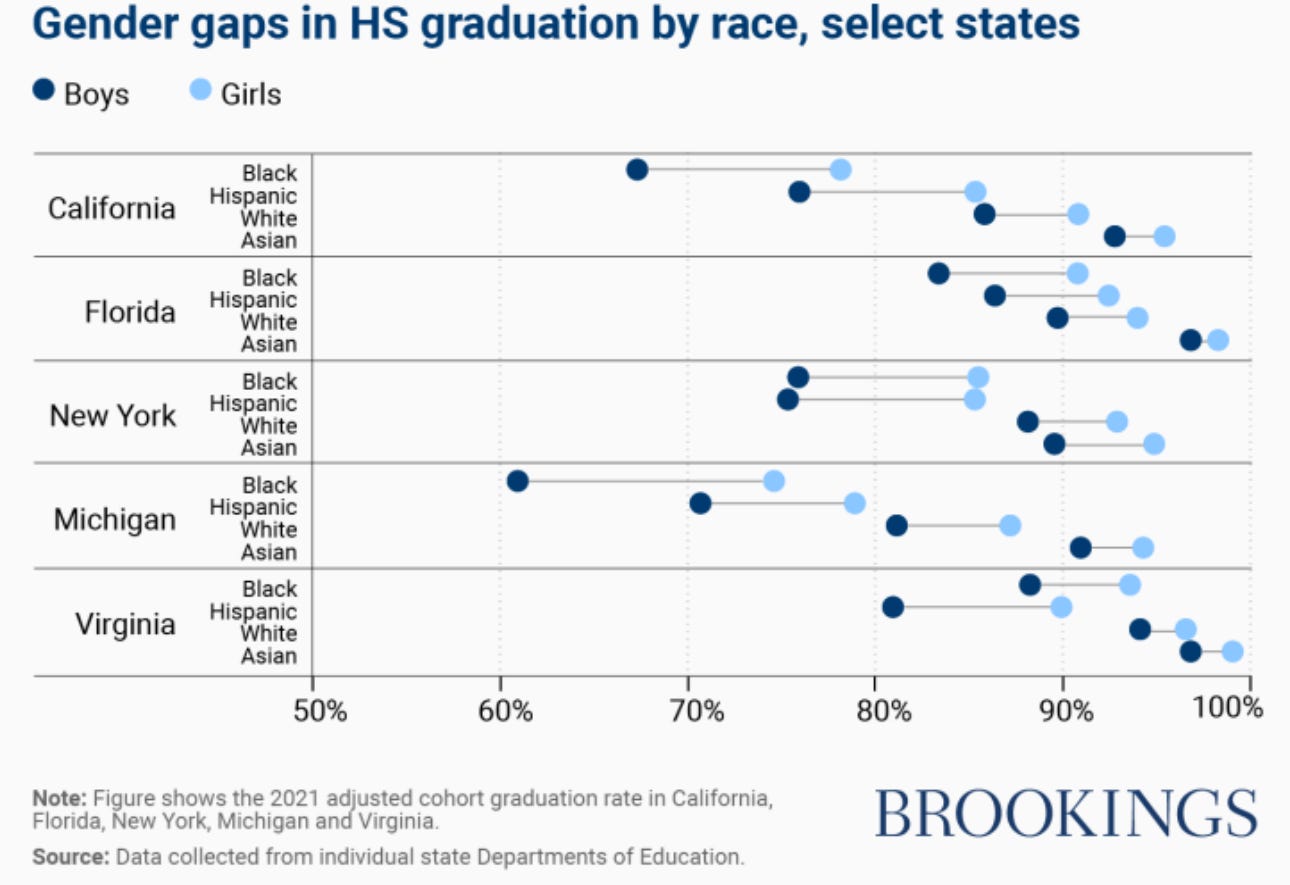Only 60% of Black boys in Michigan graduate high school on time
It's often shockingly hard to get the data on what's going on with boys
I’ve got a new piece of research up at Brookings, on the intersection of race and gender in understanding on-time high school graduation rates. The headline is that there are gaps both by race and gender, and differences in the gender gap by race.
The data here is hard to come by (for reasons I’ll get to). But the gender gap in graduation rates can be seen in every state. Crucially, the gap is much wider for Black and Hispanic students.
We focus our analysis on the five largest states, where there’s a 9 percentage-point gap between Black girls and boys, and between Hispanic girls and boys, compared to a 4-point gender gap for white students and a 3-point gap for Asian students. Across those five states, Black and Hispanic girls have graduation rates similar to white boys.
But diving down into the details for each state, we can see wide variations in overall graduation rates, as well as in the extent of race gaps, gender gaps and the intersection of the two.
In Michigan, for example, only 61% of Black boys finished high school on time in 2021, which is 14 percentage points lower than the rate for Black girls in the state, and 20 percentage points lower than for white boys:
But in other states like Florida, Black and Hispanic girls have higher graduation rates than white boys.
This data had to be collected state by state, which was a lot of work for us. (And by “us”, I mean Simran). You might think it should not be that hard. And you would be right.
As we write, the problem is simply that the data by gender does not have to be reported by states:
The Every Student Succeeds Act, passed in 2015, requires states and local education agencies (LEAs) to report the ACGR disaggregated by subgroups. Currently the law states that the data must be disaggregated by race, economic disadvantage, disability, foster care, homelessness, and for English learners. But not by sex or gender. The disaggregated data has proven valuable for assessing progress towards more equitable outcomes, especially for marginalized groups. But there is one glaring omission in the subgroups for which data is available: sex. This means we do not know the national high school graduation rates for girls and boys, nor for subgroups by race and gender, for example for Black boys. Considering how the gender gap in high school is also a racial one, it is important for policymakers to push for more complete data.
Requiring states to report their high school graduation data by sex, as well as by sex and race would not impose a new burden: states are collecting the data already. Given the growing concerns of policymakers to address educational inequities, especially considering the impact of the pandemic, it is time to address this oversight.
All Congress has to do is ask states to report data by gender (that they are already collecting) in order to allow us to get a clear picture, especially of the intersection of race and gender. It is the kind of ask that I hope the new Commission on the Social Status of Black Men and Boys will be making.
The lack of data on boys and men, or at least the difficulty obtaining it, leads to a lack of awareness including among policymakers, which in turn makes it harder to persuade them of the importance of getting better data. It’s a vicious circle. We can, and must, do better.







Richard. I have wanted to have you on The Origins Podcast for awhile.. If you are interested, please contact me... you can use this email: krauss@asu.edu Thanks. Lawrence